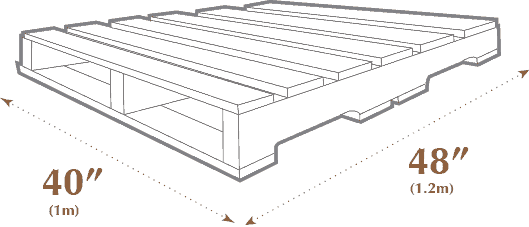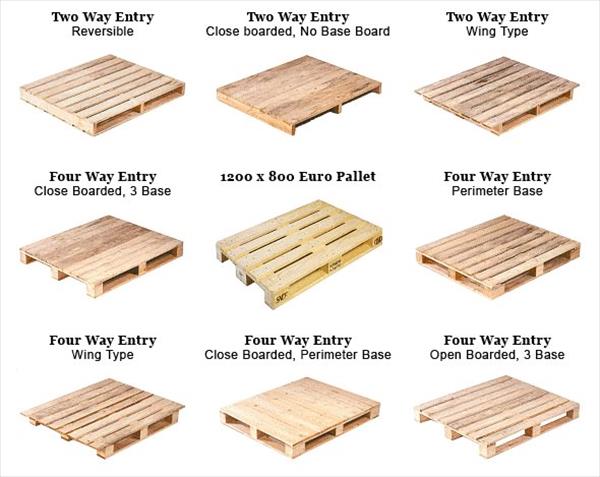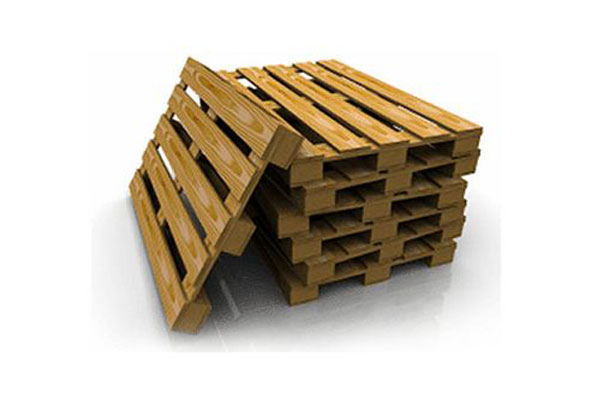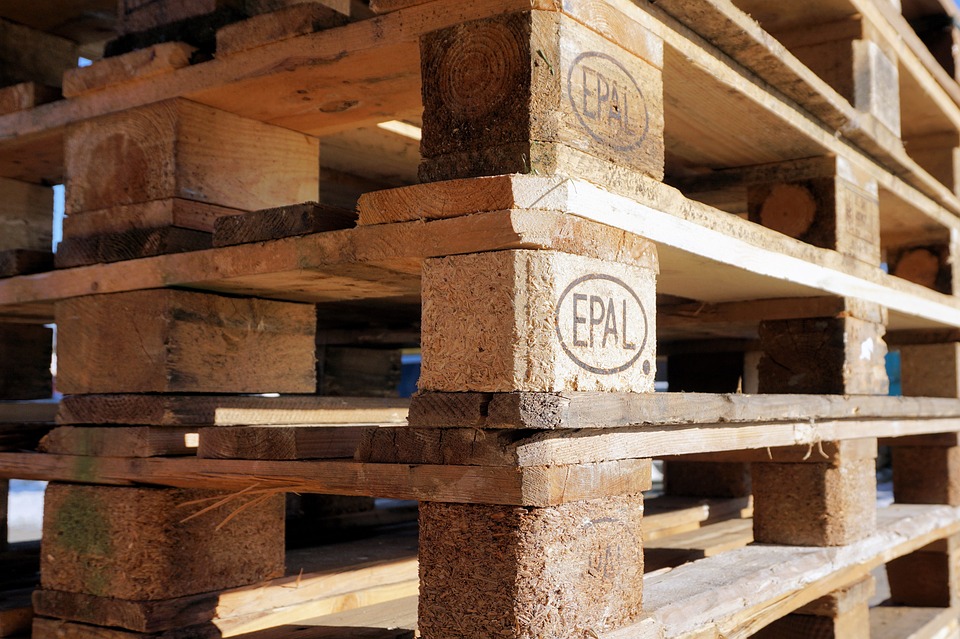Categories
- News (8)
- Industrial news (8)
So what are standard pallet sizes? Wooden pallets typically consist of three or four stringers that support several deck boards, on top of which goods are placed. In a pallet measurement, the first number is the stringer length and the second is the deck-board length. Square or nearly square pallets help a load resist tipping.
Two-way pallets are designed to be lifted by the deck boards. The standard 48″x40″ North American pallet, or GMA pallet has stringers of 48 inches and deck boards of 40 inches and was standardized by the Grocery Manufacturers Association. A standard wooden pallet (48 in × 40 in × 6 in or 122 cm × 102 cm × 15 cm) with a static load-bearing capacity of 3 short tons (2.7 long tons; 2.7 t) and a 1-short-ton (0.89-long-ton; 0.91 t) dynamic capacity, will weigh approximately 33 to 48 lb (15 to 22 kg) Lightweight plastic pallets can weigh as little as 3 to 15 pounds (1.4 to 6.8 kg), while heavier models may weight up to 300 pounds (140 kg). “Standard GMA pallets can hold up to 460 pounds (210 kg). GMA pallets typically weigh 37 pounds (17 kg) and are 6 1⁄2 inches (170 mm) tall. Their deck boards measure 3 1⁄4 inches (83 mm) wide and are 5⁄16 inch (7.9 mm) thick each. Other dimensions of pallets have different weight capacities.

Heavy-duty IPPC Pallets are approximately 44 inches (1,118 mm) wide by 48 inches (1,219 mm) long, have three wood stringers that are a nominal 4 inches (102 mm) high by 3 inches (76 mm) wide timber, and weigh about 135 pounds (61 kg). Their deck is fully covered by 30 mm (1.18 in) plywood and is painted in blue in European and Russian countries.
Four-way pallets or pallets for heavy loads (or general-purpose systems that might have heavy loads) are best lifted by their more rigid stringers. These pallets are usually heavier, bigger, and more durable than two-way pallets.
Pallet users want pallets to easily pass through buildings, to stack and fit in racks, to be accessible to forklifts and pallet jacks, and to function in automated warehouses. To avoid shipping air, pallets should also pack tightly inside inter-modal containers and vans.
No universally accepted standards for pallet dimensions exist. Companies and organizations utilize hundreds of different pallet sizes around the globe. While no single-dimensional standard governs pallet production, a few different sizes are widely used.

The American National Standards Institute (ANSI), for example, was established in 1918 so that a project going up in one state could use girders and bolts made in another state with minimal difficulty. Following the Second World War, these national bodies came together to facilitate trade. The International Organization for Standardization (ISO) was established, and it has created global standards for dimensions and measures ever since.
Complying with ISO standards makes expansion easier down the line for a business, and this applies not only to manufacturing but to transportation and warehousing storage as well. However, companies looking for ISO standard pallet size dimensions won’t have much luck. That’s because there isn’t any single set of ISO standards for pallets, only specifications recognized by ISO.
| Dimensions (W × L) mm | Dimensions (W × L) in | Wasted floor, ISO container | Region most used in |
|---|---|---|---|
| 1016 × 1219 | 40.00 × 48.00 | 3.7% (20 pallets in 40 ft ISO) | North America |
| 1000 × 1200 | 39.37 × 47.24 | 6.7% | Europe, Asia; similar to 40″ × 48″. |
| 1165 × 1165 | 45.9 × 45.9 | 8.1% | Australia |
| 1067 × 1067 | 42.00 × 42.00 | 11.5% | North America, Europe, Asia |
| 1100 × 1100 | 43.30 × 43.30 | 14% | Asia |
| 800 × 1200 | 31.50 × 47.24 | 15.2% | Europe; fits many doorways |

Of the top pallets used in North America, the most commonly used by far is the Grocery Manufacturers Association (GMA) pallet, which accounts for 30% of all new wood pallets produced in the United States. The ISO also recognizes the GMA pallet footprint as one of its six standard sizes.
| Dimensions (W × L) mm | Dimensions (W × L) in | Production Rank | Industries Using |
|---|---|---|---|
| 1016 × 1219 | 40 × 48 | 1 | Grocery, many others |
| 1067 ×1067 | 42 × 42 | 2 | Telecommunications, Paint |
| 1219 × 1219 | 48 × 48 | 3 | Drums |
| 1219 × 1016 | 48 × 40 | 4 | Military, Cement |
| 1219 × 1067 | 48 × 42 | 5 | Chemical, Beverage |
| 1016 × 1016 | 40 × 40 | 6 | Dairy |
| 1219 × 1143 | 48 × 45 | 7 | Automotive |
| 1118 × 1118 | 44 × 44 | 8 | Drums, Chemical |
| 914 × 914 | 36 × 36 | 9 | Beverage |
| 1219 × 914 | 48 × 36 | 10 | Beverage, Shingles, Packaged Paper |
| 889 × 1156 | 35 × 45.5 | Unknown | Military 1⁄2 ISO container, fits 36″ standard doors |
| 2240 × 2740 | 88 ×108 | Unknown | Military air cargo |
| 1219 × 508 | 48 × 20 | Unknown | Retail |
The Euro pallet is a block pallet that has dimensions of 800mm by 1200mm. The pallet looks like a traditional American pallet, but it also has a box on top of the pallet that is designed to hold products in place. The general appearance of the pallet makes it look like a crude raft or boat design.

All standard pallet size Euro pallets must be stamped with the EUR logo to be “official” pallets. They are also sometimes called “E” pallets. Not surprisingly, there are no official Euro pallet manufacturers in the United States. There are also no licensed repair facilities for the pallets.
If United States customers want to use the same design as the Euro pallet, there are options available. These pallets are known as “Euro collar” pallets and look just like the official pallet design. Some even come in the 800 by 1200mm size as well, but other size options are also available. These collars have a steel lip that helps them fit over traditional wood pallets for extra security and stability.
There is also a second kind of Euro pallet that is used in the European chemical industry. These pallets are called “CP” pallets. These standard pallet sizes are specifically designed to resist chemical exposure and are made from both wood and plastic.
| EURO pallet type | Dimensions (W × L × D) | ISO pallet alternative |
|---|---|---|
| EUR EUR 1 | 800 mm × 1,200 mm × 145 mm 31.50 in × 47.24 in × 5.71 in | ISO1, the same size as EUR. The pallet weight is 20 – 25 kg. Weight of a load: 2490 kg. |
| EUR 2 | 1,200 mm × 1,000 mm × 144 mm 47.24 in × 39.37 in × 5.67 in | ISO2. The pallet weight is 33 kg. Weight of a load: 1470 kg. |
| EUR 3 | 1,000 mm × 1,200 mm × 144 mm 39.37 in × 47.24 in × 5.67 in | The pallet weight is 29 kg. Weight of a load of 1920 kg. |
| EUR 6 | 800 mm × 600 mm × 144 mm 31.50 in × 23.62 in × 5.67 in | ISO0, half the size of EUR. The pallet weight is 9.5 kg. Weight of the safe load: 500 kg. |
| 600 mm × 400 mm 23.62 in × 15.75 in | quarter the size of EUR | |
| 400 mm × 300 mm 15.75 in × 11.81 in | one-eighth the size of EUR |